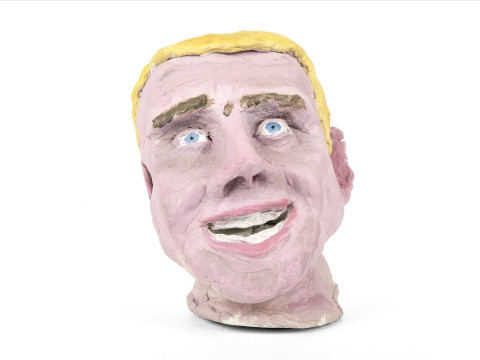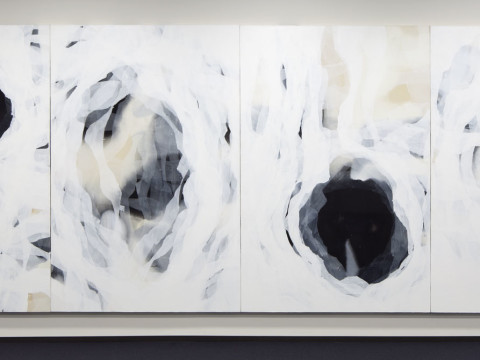
19 pieces of creative advice from artists and architects
Published on 26 July 2020
There’s no right way to be creative – but leading artists and architects have plenty of tips to get you started. We revisited some of our most popular interviews to share creative wisdom from Antony Gormley, our President Rebecca Salter, Lubaina Himid and many more.
1. First up – don’t think, just do, says Antony Gormley RA.
“I always say to people, ‘don’t think about it, just do it’ – you really don’t need very much to be creative. I happened to have a bunch of satay sticks at the studio, and for The Line’s recent activity pack, I just threw them in the air. You can photograph them as they fall – try using the slow-mo on your camera – and see different forms appear. By watching processes like this, you can gain enormous experience that will inform your work.”
2. Do a little bit each day, suggests Lubaina Himid RA.
“Rather than thinking ‘I’ll start this when I retire, or I’ll do this at the weekend’, just do a little bit each day. If you spend some time each day, it just becomes part of your life. Making work takes constant application – and some of it’s not that pleasurable to do. But the moments of pleasure, and being able to share them, are immense.”
3. Don't try to be too inventive, says Michael Craig-Martin RA.
“The more your art reflects you, the more it will speak to other people. If you are not sure what you should do, just do whatever comes into your head or catches your imagination. Gradually, it will lead you to where you should be. Making art is a path not a destination.”
4 ...and don't wait for inspiration to strike, says Thomas Heatherwick RA.
“I deliberately, stubbornly oppose the notion of revelation. It has become popular in our time because people want to believe in inspiration and genius, as there is less confidence in religious divinity. Even the word ‘inspiration’ has an onomatopoeic quality that we enjoy – it sounds in the ear like a sudden flash of revelation. But inspiration is a cliché in everyone’s head. It’s what we think happens to people who develop ideas.”
5. Broaden your areas of interest, says Barbara Rae RA.
"Work hard and study lots of potential subject matter. Attaining expertise is more than just acquiring basic technical skills. It comes down to a way of seeing – the great painters developed a unique vision. Every artist needs a creative vision.”
You can work in a telephone box if you really, really want to make art.
Rebecca Salter PRA
6. Be prepared to imagine something different, Sonia Boyce RA says.
“If we are unhappy with a scenario, what kind of other scenario might be bearable, if not really euphoric? We can think these things though – it’s not rocket science.”
7. Rely on yourself, says Richard Deacon RA.
"My advice for young artists is to never put yourself in a position where someone can say no. Do things for yourself, try to work it out and don’t be dependent on other people’s affirmation or rejection – because once people have said no, it’s very hard to get them to change their minds."
8. Challenge prejudice, says Yinka Shonibare RA.
“Most prejudice actually comes from ignorance – it’s really because people don’t understand each other and they’re scared. But by actually exposing people to other cultures and other ways of doing things, it expands their horizons and their imagination as well. That’s what I’m trying to do in my work.”
9. Edit your composition over and over again, said the late Zaha Hadid RA.
“Architecture is like writing – you have to edit it over and over again, until it actually looks seamless, it looks effortless.”
10. Don't have a studio? Don't let that stop you, says RA President, Rebecca Salter.
"You can work in a telephone box if you really, really want to make art. Obviously it’s better if you can have your own space and lock the door and all the rest of it, but if you’re really determined, you can work in the tiniest space. There’s always something you can do.”
11 ...although that might be tougher for sculptors, Eva Rothschild RA points out.
"My advice for younger sculptors would be make sure you have a reliable studio space. I think that means move out of London.”
If it’s a good piece, there is a moment where you get this calm and reflective experience.
Rana Begum RA
12. Now check yourself: do you really want to be an artist, asks Tess Jaray RA?
"There is only one rule for aspiring artists. That is, only become one if you have absolutely no choice, if your drive is so strong that nothing else could be contemplated. And if you understand that you are choosing an interesting life, but probably a very difficult one. If you think in terms of worldly success, forget it. The rewards are in the doing and in the breadth of art.”
13. If you do, put in the time, says Eileen Cooper RA.
"Hard work can put you in the right place at the right time. It’s important to remind yourself that without those hours of standing painting, scraping off, moving backwards and forward, picking up one piece, putting down another piece, squeezing out more paint, it doesn’t happen.”
14. Don't get too comfortable, offers Edmund de Waal.
“When I’m writing, I always sit on this 15th-century Ming Dynasty Chinese scholar’s chair. It’s important to not always be too comfortable. I think there are different kinds of attention, and sitting in a huge comfortable armchair doesn’t make you work harder.”
15 ...and thicken that skin, suggests Michael Landy RA.
"Show work early on because you learn a lot through exhibiting. But you’ve got to have a thick skin. As an artist you have a number of careers. Trends change. Your face fits one moment and it doesn’t fit the next. You have to roll with the blows and not take it personally.”
Don’t be dependent on other people’s affirmation or rejection – because once people have said no, it’s very hard to get them to change their minds.
Richard Deacon RA
16. Trust yourself – you’ll know when the work is right, says Rana Begum RA.
"If it’s a good piece, there is a moment where you get this calm and reflective experience. It’s like life, isn’t it? You don’t have full control over the balance of chaos or calm.”
17. Don't forget – you can make a difference, says Ai Weiwei.
“I feel powerless all the time, but I regain my energy by making a very small difference that won’t cost me much."
18. Of course, there's no one way to be an artist, Conrad Shawcross RA reminds us.
"Being an artist can be whatever you want it to be. You can be a hermit and paint all your life and never go out and see the light of day if you want to. It’s totally your own privilege how you decide to be an artist.”
19. Just be patient and keep going, says Phyllida Barlow RA.
"Try and balance how you make work with getting some kind of income. And don’t expect it all to happen at once; go for the long game. Most of all, be patient with yourself and just keep going.”
What are your creative tips? Share them with us using #CreativeWisdom.
Related articles

Jock McFadyen RA: postcards from a post-apocalyptic future
28 February 2022

How to: paint with words like Patrick Moses
14 December 2021

Video: Annette Fernando at the Summer Exhibition 2021
3 December 2021


